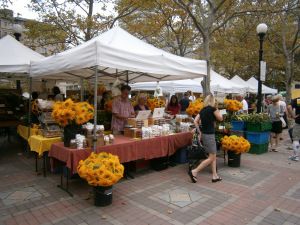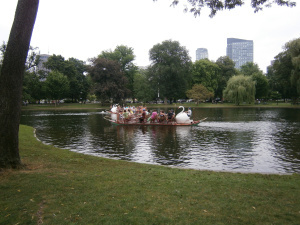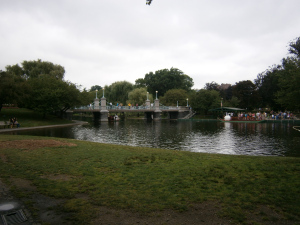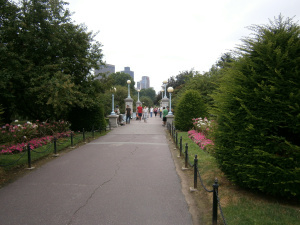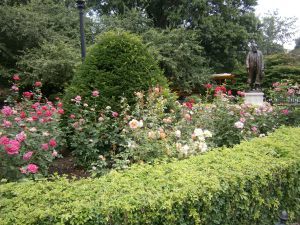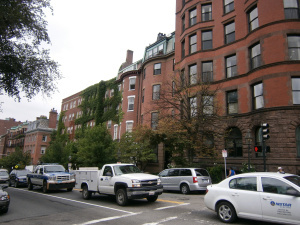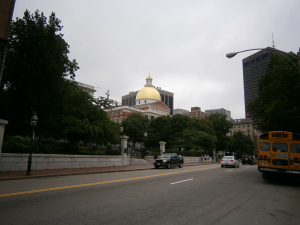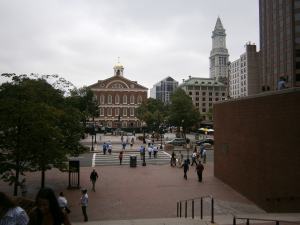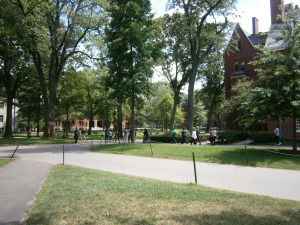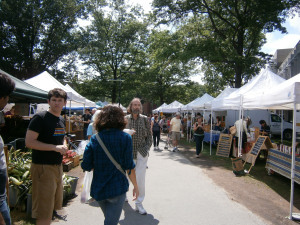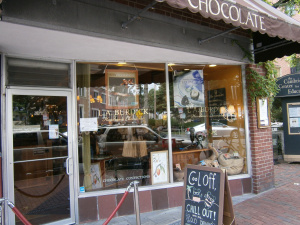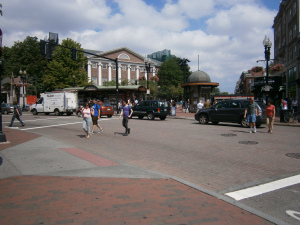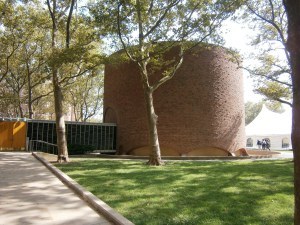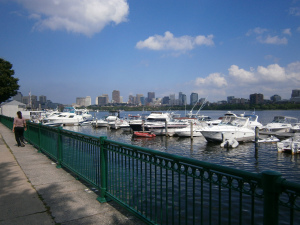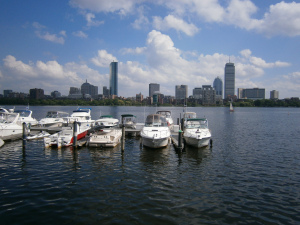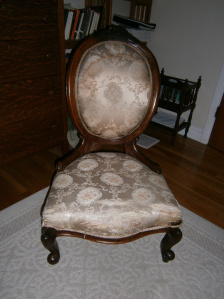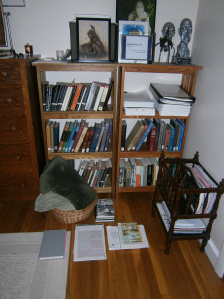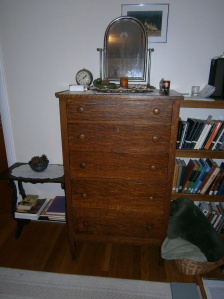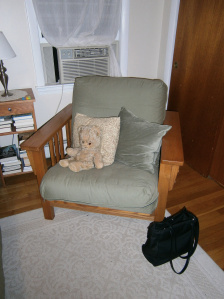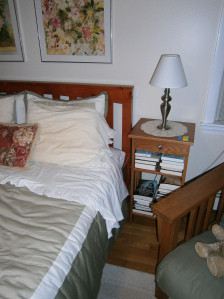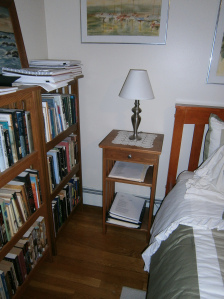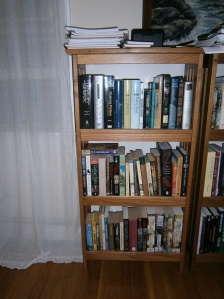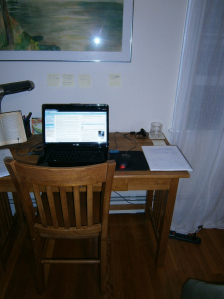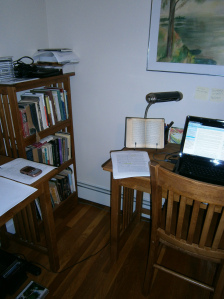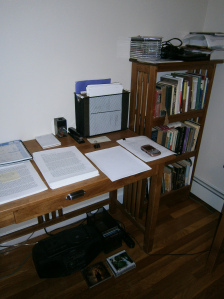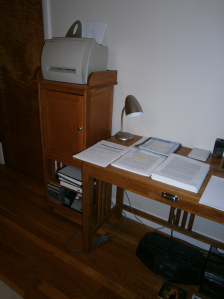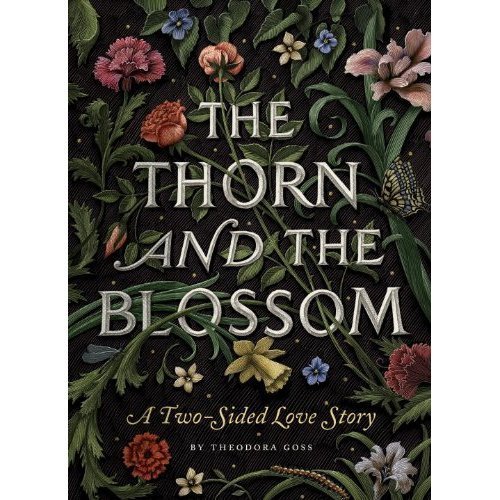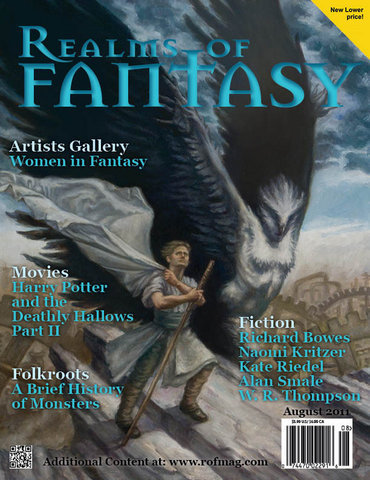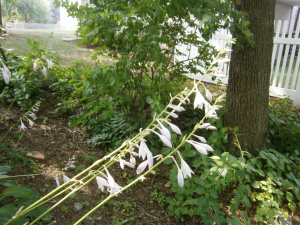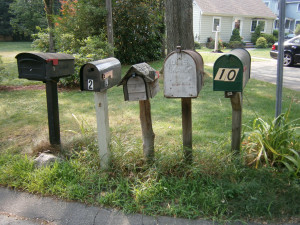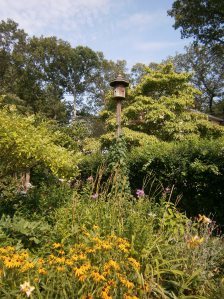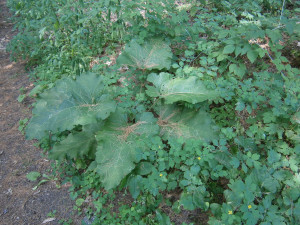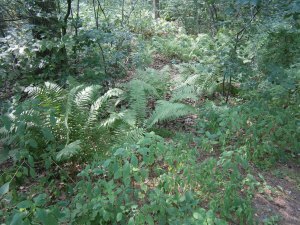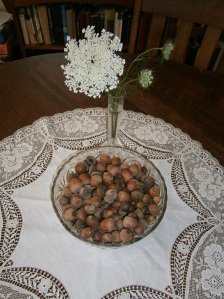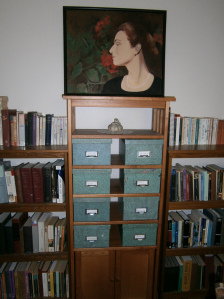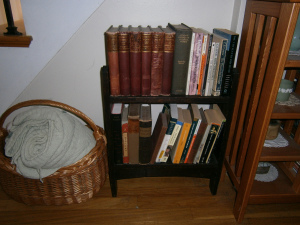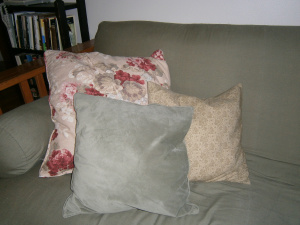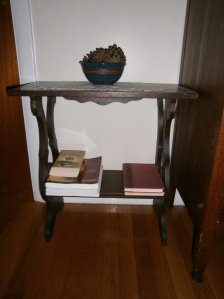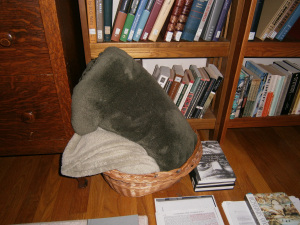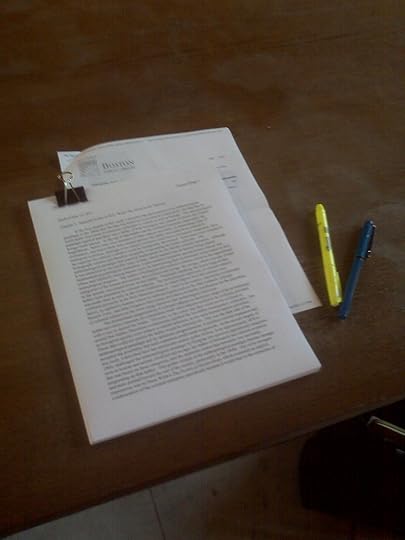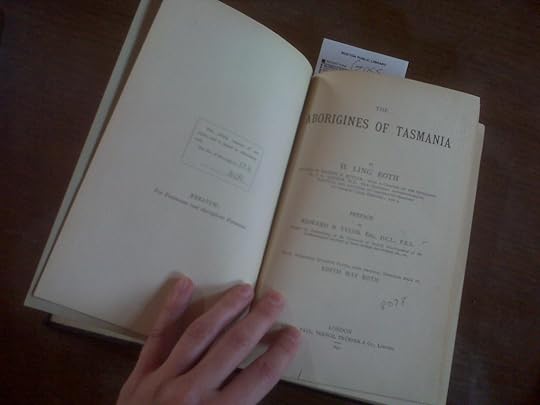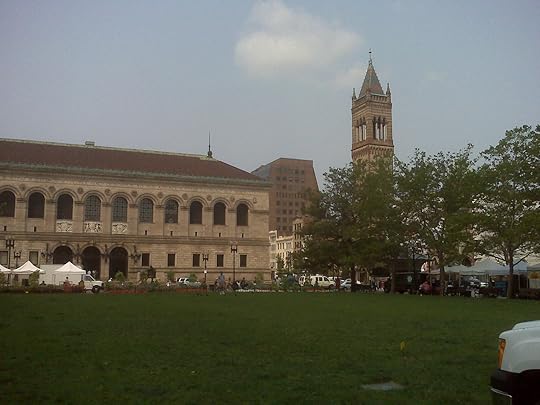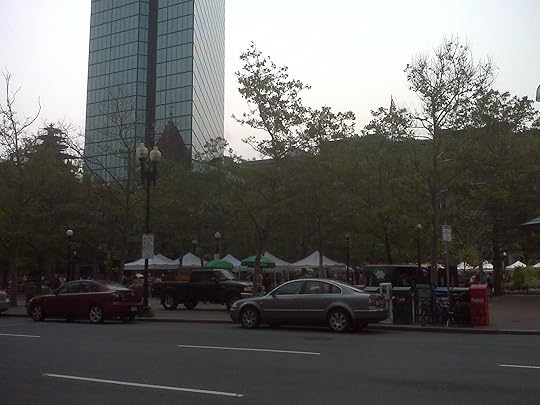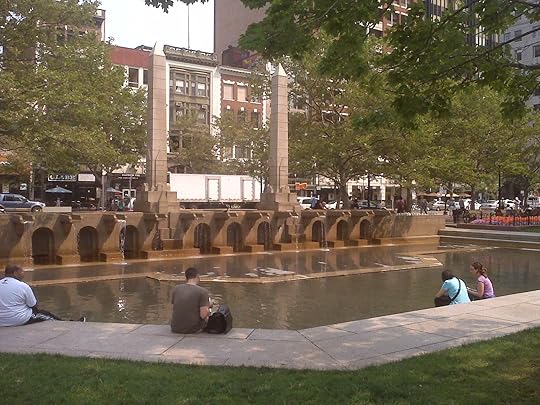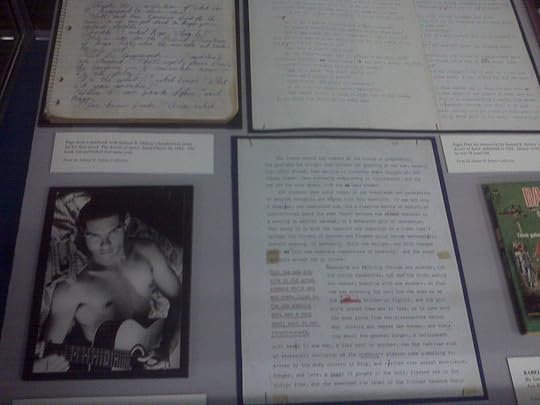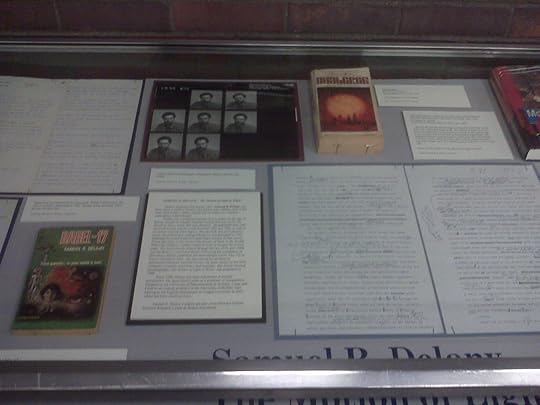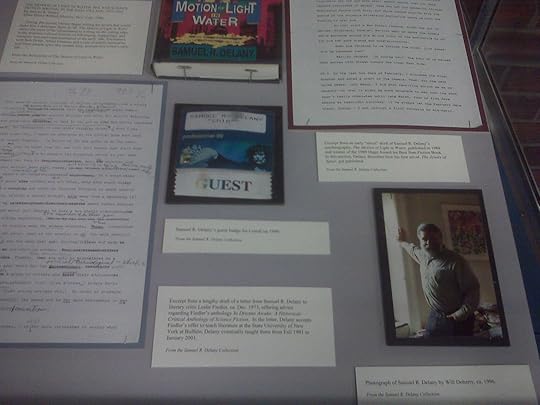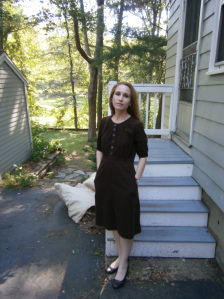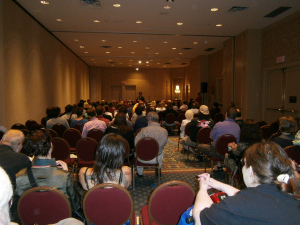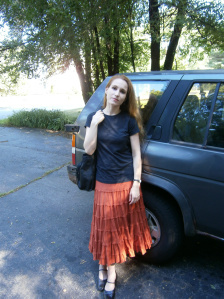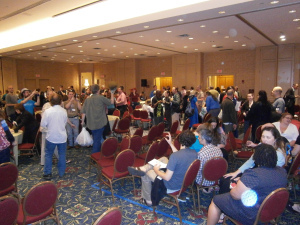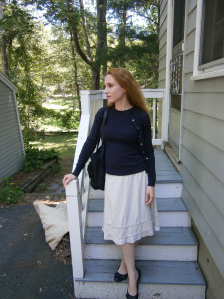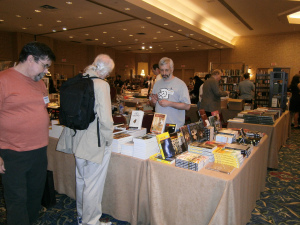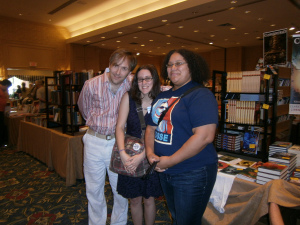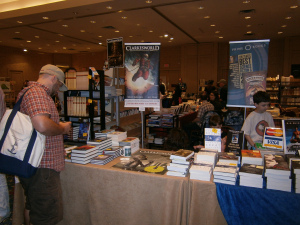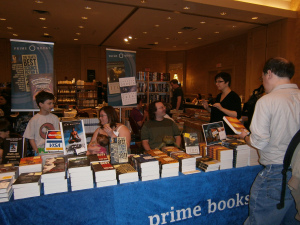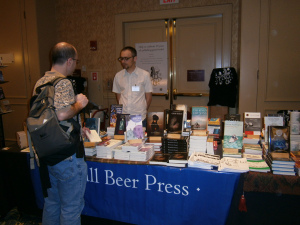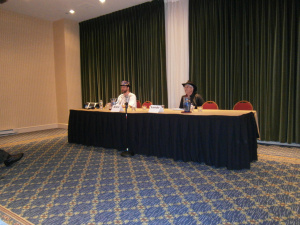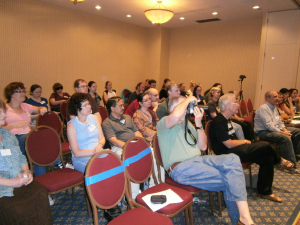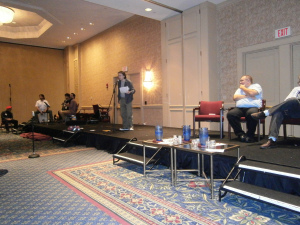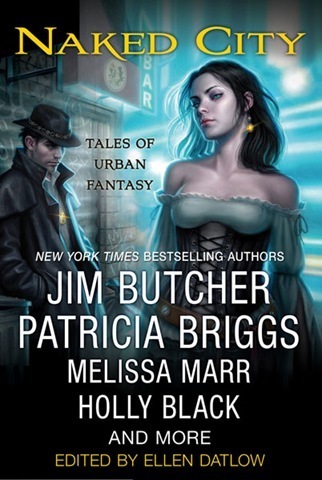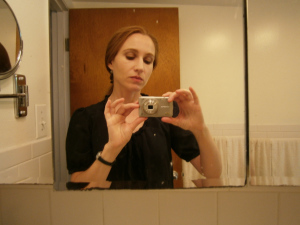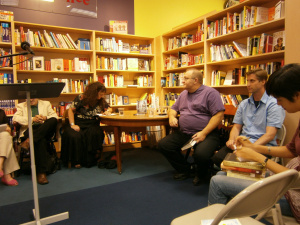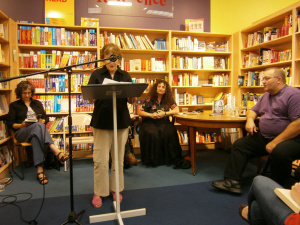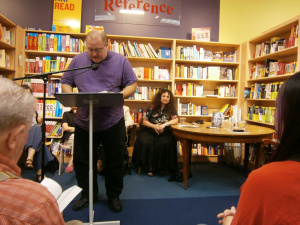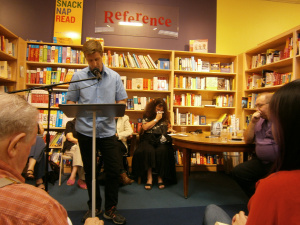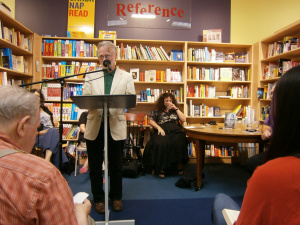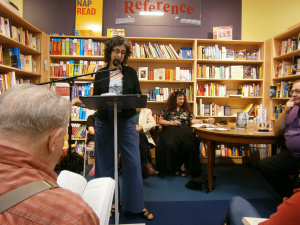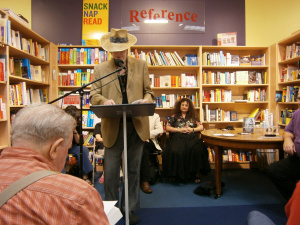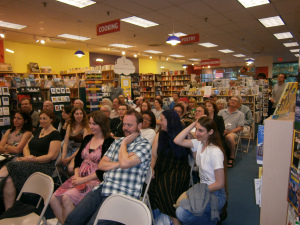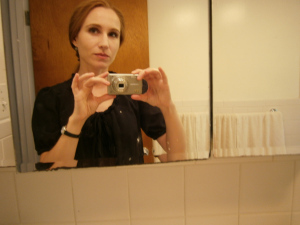Theodora Goss's Blog, page 53
July 26, 2011
Walking in Boston
Status report: This morning, I went to the university library to pick up some books and photocopy an article. I wasn't able to finish the footnotes to the second section of Chapter 2 yesterday, so I'm going to work on them tonight. And then tomorrow, I'm going to complete the second section and go on to the third section. Once that's done, later this week, there will just be the introduction to write. And then, the entire dissertation will go together. I will spend August making final revisions, and hand it to the committee on September 1st. At least, that's the plan.
But this afternoon I took some time off to show my friend Luke Taylor around the city. Luke and I first met when he was in middle school. His mother was a friend of the family, and she knew that I was a writer. Luke wanted to be a writer as well, so she told him that he should talk to me about writing. I still remember reading some of his earliest stories and writing him a recommendation for his first writing workshop. He's now a college student working on a degree in filmmaking. We met up at the Boston Public Library and walked through Copley Square, which was once again holding a farmer's market. I particularly liked this booth with sunflowers. Van Gogh would have liked it as well.
We walked through the Common. Here you can see one of the swan boats, and the financial district in the distance.
I've always liked this part of Boston, which reminds me of a European city. Here is the bridge over the pond.
We walked across the bridge and through the park. There are always musicians playing here. In summer, it's as though Boston becomes an enormous performance space.
I took a picture of these roses in full bloom. At first I thought they must be hybrid teas, since that's what you always see in parks. But I smelled them, and they were almost certainly the David Austin English roses that were developed in the 1990s. They smelled almost like roses should, although the David Austen roses don't have the heady fragrance of the true old roses.
Lining the park are the brownstones Boston is famous for. I put Miss Lavender's School of Witchcraft in this neighborhood. It seemed like the right place.
I should probably have gotten a better picture of the Capitol Building, but the streets were clogged with people and buses. That's what Boston is like in the tourist season.
We walked to Quincy Market, where there were more tourists and street performers. I wanted to show Luke the touristy Boston, so he could at least say he'd see it.
But then we headed across the river, to Central Square. We had lunch at Asmara, the Ethiopian restaurant, and walked across the street to Pandemonium, the science fiction and fantasy bookstore. I bought Stories, edited by Neil Gaiman and Al Sarrantonio. It's a book that's trying to make a point, and I want to see what sorts of stories they've chosen to make it. We walked down Massachusetts Avenue to Harvard Yard, which was also filled with tourists. I miss the way it used to look when I was in law school, with elms like the pillars of a great cathedral.
Harvard was also having a farmer's market. I tried Kombucha, simply to say that I'd tried Kombucha. It was all right. But honestly, I'd rather just have tea.
Of course we had to stop at Burdick's for chocolate. They have the most amazing pastries. Honestly, the best I think I've tasted in the United States. They taste like pastries you might buy in France, where pastry-making is an art.
Then we walked back to Harvard Square and stopped in the Coop. I remember when it was very much the Harvard Cooperative Society. Now, it looks more like an average bookstore. (Coop is pronounced like a chicken coop, by the way. Not like co-op. At least, it was when I was at Harvard.)
We took the T to MIT, where we went into the MIT chapel, which was designed by Eero Saarinen. It's one of the loveliest, most restful modern buildings I've ever been in. From the outside, it looks like a brick cylinder surrounded by a moat.
On the inside, it's luminous. What looks like falling rain is actually a cascade of metal rectangles that reflect the light. The chairs are simple, almost like Shaker chairs. It's all brick, stone, wood, metal – and light.
Finally, we walked down to the Charles River. The view from the river is one of my favorite views of Boston.
See what I mean? We walked across the bridge from MIT to Boston, and then went into the Boston University bookstore. Yes, our third bookstore of the day.
At that point we had seen downtown Boston and Cambridge, three universities, three bookstores, and a river. We were tired, and it was time for me to get back to work. But it was so nice to get out for an afternoon, show the city to someone who had never seen it before, talk about the differences between Boston and where we had grown up (since both Luke and I grew up in Virginia). Also, talk about the differences between writing and filmmaking, which was a fascinating topic.
Now I'm going to work on the second section of Chapter 2, as long as I have the energy. And I'll be back at it tomorrow. When I get particularly tired, I remind myself that the world is still out there. It's big and beautiful, and I will spend a lot more time in it. Soon.








July 24, 2011
Roses All the Way
Status report: I'm tired and despondent. The revisions to Chapters 1 and 3 are finished, except for the introductions, but I'll need to write the general introduction first and make sure those are consistent with it. I'm working on Chapter 2. I've revised the introduction and half of the first section. By tonight, I'll have the entire first section done. Then two more sections to go. Those will take a bit more time, because I need to add some footnotes. Once I have Chapter 2 done, all I'll need to do is write the general introduction, for which I already have nine pages of notes. And then I'll put the whole thing together, go over it all one more time, and it will be done. At that point I'll only revise what I'm told to. The whole thing should be ready to go to the committee on September 1st.
I write all this to remind myself of how far I've come, how much I've already accomplished. How little, in the grand scheme of things, still needs to be completed. I need that sort of encouragement, because the day to day of it is grueling. It's hot, I'm despondent as I've said, and there isn't a lot I can do that's fun or interesting. At least I'll have the trips to New York and Asheville to look forward to.
I honestly don't know what to write about today, except perhaps fabric. Yes, fabric. Yesterday, I bought that Victorian chair, and during a break from revising, I went to the fabric store to get a sense for what sort of upholstery fabric I might want on it. Because, as you know, it needs to be reupholstered.
So I looked at a couple of my old favorites, like Waverly's Norfolk Rose:
And Waverly's Fairhaven.
These pictures are taken with my cell phone, and they're darker than the actual fabric, which has a cream background. I was thinking of the Waverly patterns because they're fresh and feminine, which is what I want on this chair. The chair itself is visually heavy, so I want a fabric that's light. And I was thinking of roses because there are two carved roses on top of the back rest, and I thought the visual echo might be interesting.
Then, while I was looking at fabric patterns online, I saw this:
It's the same pattern as the pillows I bought several weeks ago, pink and red geraniums on a taupe background. I fell in love with it when I saw the pillows, and I still love it. So I put one of the pillows on the chair to see what it would look like:
The pattern is probably too big, isn't it? So I don't know. I like it better than the Waverly, but I'll have to talk to the upholsterer and see what he or she says. (Also, it's quite expensive, about $32 per yard. But it's worth paying for upholstery fabric, because you're going to live with it for a while. Also, no visual pun on roses, but that's all right.)
So at least that distracted me for about an hour from the dissertation.
It's hot and I'm having no fun at all right now. And I think, my life needs to change, and it needs to change soon. Or I'll jump off the roof. (No, that's not a serious threat. I don't think I'd look very attractive splattered on the driveway. I'm much more likely to look out the window toward Camelot, get into my boat, and float down the river. That's more my style.)
It's such a small thing to keep one going, a chair to reupholster. But some days, that's the sort of thing that gets me through.








July 23, 2011
The Mess
Status report: Today, I worked on Chapter 2. I will be working on Chapter 2 late into the night. But I took some time to go to my favorite antiques store, where I did something that may be very silly, I don't know. I bought a chair. This chair, specifically:
I know, the upholstery is tattered and stained. But the chair itself is a lovely old Victorian piece, with roses carved on the top. (Those did not come through well in the photograph.) It will need to be reupholstered, of course, which means that my $40 chair (yes, that's how much I paid for it) will probably need another $140 worth of work. But I saw it sitting outside the antiques store, and something drew me to it. Some pieces of furniture have a sort of charm about them, something that makes them particularly attractive. I liked its proportions and how low it was: the perfect height for me. I can imagine it reupholstered in a Waverly pattern, perhaps something with roses on it. And I have to say, when I sit in the chair, even in its current tattered state, it has a sort of magic about it: I feel calmer. I think proportions do that to us, make us feel certain ways. In my grandmother's apartment in Budapest, with its 18-foot ceilings and enormous windows, I always feel calm and at ease.
And I need calm now, because my life is a mess. I have so much to do, and there's simply no way to keep up. You can always tell when my life is a mess, because my room is a mess. There are papers and books on the floor, pictures that still need to be hung up months after I bought them.
The necklace I bought is still on top of the dresser in its box, rather than in its proper place in my jewelry drawer. I still need to move the painting behind the mirror.
The beside table is overflowing with books I haven't read, although at least I've managed to clear off the chair.
There are stickies on the table, because I've been marking pages as I read. Research, you know. At least the bed is made. I can't stand unmade beds.
In the other bedside table is the manuscript for a poetry collection that I've had no time to work on. The shelves are covered with writing projects in piles.
The books are completely unorganized, so when I go to look for one, I look on all the shelves, trying to remember where in the world I put it. I miss the days when I knew where my books were, but that was in the apartment, two years ago.
There are stickies on the walls and on my desk. The desk itself has a constantly revolving pile of papers, depending on what I'm working on that day.
I think I have three computers in my room: my current one, my old one, and the netbook. Plus my Blackberry. Well, at least I won't lose contact with the world.
The other desk is covered with the dissertation, in piles. Also my calender, marked to show all the deadlines. There are so many of them!
And that's the end of the tour. The desk with piles, the printer. Paper, paper everywhere. When I die, will I be held personally responsible for the deaths of all those trees?
I know, all I'm doing in this blog post is complaining. But that's all I have for you tonight: complaints and the knowledge that I need to get back to Chapter 2.
Someday, and it's going to be someday soon, I'll have a space I love. It's going to be perfectly organized, and everything will be in the right place. I'll know where my books are. The paintings will be hung, properly framed, on the walls. There will be no piles on the floor. The new chair will be reupholstered, and I will sit in it, looking around, pleased and satisfied. Until then, I'll do the best I can with what I have, even if I sigh when I look at it. And I'll trust that it's coming – the place in which I'm going to write all those brilliant books.








July 22, 2011
The Secret Garden
Status report: It's been a strange day. I'll tell you why in a moment, but first, an actual status report. Chapters 1 and 3 are revised. I'm working on Chapter 2. I'm going to try to finish that chapter over the weekend, so that next week I can focus on the introduction. I need to get that done by August 3rd, because on the 4th I'm going to New York. I'll be there until the 7th. Then I'll have another week to revise, and then I'll be in Asheville for a couple of days. It will be nice to get out of town for a while.
So my status report is that I'm working on Chapter 2, hoping to have that finished soon. And I'll be working on the introduction next week.
Why did I have a strange day?
Well, as you know, the edits to The Thorn and the Blossom were completed yesterday. Today I looked at the Amazon page for the book, and I saw this:
The cover! Isn't it gorgeous? Now, I still can't tell you anything about the story itself. But I can tell you this. What you see above isn't the cover of the book. No, it's the cover of the slipcase. The book actually goes inside the slipcase. And I'll tell you about it as soon as I'm allowed, but I promise that it's going to be just as beautiful.
When I first saw the slipcase at Readercon, I thought, it looks like a secret garden. Like a thicket through which you push, to enter an enchanted place. I hope the book itself will be that sort of enchanted place to its readers. I also think it's interesting that the design looks so much like something I would choose and love. I mean, doesn't it look like the dress I'm wearing in the photograph on this page? A little like a William Morris design gone wild and natural, rather than stylized.
And then, I received the final proofs for my Folkroots column in the August issue of Realms of Fantasy. Which also has a gorgeous cover:
My column for the August issue is about monsters, as you can see from the title. I think it will interest Realms of Fantasy readers. I certainly hope you like it! And the next column will be "The Myth and Magic of Narnia." I especially enjoyed writing that one.
Finally, my brother wrote me a message that said, "Did you knew Kevin Brockmeier mentioned you in Salon?" And he sent me a link to this article: "A Wistful Farewell." It's about the closing of the Borders bookstores, and in it, prominent authors reminisce about their experience with Borders. Brockmeier writes,
"The truth is that I've only known three Borders branches well – in Ann Arbor, in Madison, Wis., and in Gainesville, Fla., – but at each of them, I've discovered books I grew to love, and not just best-sellers, either, but strange little small press books: In the Forest of Forgetting by Theodora Goss, I've Heard the Vultures Singing by Lucia Perillo, Written Lives by Javier Marias."
So, Kevin Brockmeier read and liked my short story collection! Now that is seriously cool.
Do you see why my day has been so strange? Here I've been, correcting the citations to H. Ling Roth's The Aborigines of Tasmania and adding a footnote on the influence of Jonathan Swift's Gulliver's Travels on H.G. Wells. And all the while, the important things have been happening. And they've had nothing to do with my dissertation. They've been the real things, the things that happen in the world. The very large world outside this room and the research I'm doing – a world I very much want to be a part of. And will be, I hope. Soon.








July 21, 2011
Shabby Mission
Status report: I didn't work as much on my dissertation today as I should have, because I was still working on The Thorn and The Blossom. Today was the day we made the final edits, so I spent quite a long time on the telephone with my editor, and then there was some email correspondence. (Thank goodness for my Blackberry.) While all of this was going on, I thought, this is a new paradigm, isn't it? Because I don't think this is the way publishing used to work. I like the new paradigm: I think it gives authors more freedom than they used to have, allows them to do things they didn't used to be able to do. But I can understand why it makes some writers nervous. It means inhabiting a world that moves more quickly, in which you have to be more connected than before. It's harder to live in a cabin on the side of a mountain and just write – I mean if you actually want a writing career.
So it was a busy day, but in the middle of it, I took a walk around the neighborhood and took pictures of the sorts of things that inspire me. I said once that I called my decorating style Shabby Mission. The "Shabby" comes from Shabby Chic, a decorating style associated with the designer Rachel Ashwell. It's often mischaracterized, so if you google the words "shabby chic," you may get pages of pastel horrors, which is not at all what the style is about. At its core the style is about accepting the faded, the shabby, the incomplete. Ashwell lives in Los Angeles, and she focuses on pale woods, walls, linens. Those sorts of things look right in the California light, but not in Massachusetts. The "Mission" comes from the fact that I love Mission Style, with its solid woods and dark colors – its greens and ochers. But true Mission Style is incredibly expensive, and it can also be cold. In magazines, Mission Style rooms often look as though they are museums, as though one could not live in them. So I combined the two ideas into Shabby Mission: a style informed by Mission Style, but also by the lived-in aesthetic of Shabby Chic.
My aesthetic, if you want to call it that, is based on the natural world around me. I love the colors in forests, gardens. Like the hostas that are blooming behind the shed.
Or this pile of split wood in a corner of the back yard. I love greens and browns.
Across the street were these mismatched but rather charming mailboxes.
Down the road to the park was this garden, in full bloom. This is the sort of garden I like, spilling over its wall.
In the middle of the garden was this birdhouse. I like that it's built of wood, and I like the Black-Eyed Susans beneath it.
The park is surrounded by forest, and by the forest path was this large plant. I'm not sure what it is.
And look at these gorgeous ferns. I love the way green layers on green in the forest. That's something I try to do in my decorating.
So now, on to the decorating itself. I brought home some Queen Anne's Lace and put it in a vase on the dining room table, next to a bowl full of acorns.
In the dining room is this shelf, with books and my favorite green pottery. Do you see what I mean by Shabby Mission? It's Mission Style, but not the expensive stuff.
I like chandeliers. This one is in the dining room. I also like curtains that let in light, like the lace curtains here. Those were made out of table clothes that I cut in two. The painting is of a road through the forest, by my grandmother.
This shelf is for supplies of various sorts, in green file boxes. The painting on top is of me, painted by my grandmother. I really should hang it up, shouldn't I?
This is the small shelf I bought at the antiques store, with books (including a lot of Ruskin). Next to it is a basket with blankets. I keep baskets filled with blankets in several rooms. You never know when you might need a blanket, and they just look cosy.
These are pillows on the futon, which serves as a sofa. I realized at one point that I decorate as though I were living in a forest: in browns and greens. (I sewed the smaller pillow to the right from a William Morris fabric.)
Remember this small shelf? It was a thrift store find. On top is a pottery bowl from the same thrift store, filled with acorns. Right now, this is where I'm keeping the books I need for my non-dissertation research.
And finally, this is what my floor looks like at the moment. Things are actually more shabby than I would like, with piles of papers and books everywhere. I prefer things to be worn but neat. Here is the basket I keep in my room for blankets. It's actually larger than it looks: I took this picture from a strange angle.
That's all for now. I still have work to do tonight. But I thought I would write at post on my preferred decorating style. I'm doing so much writing nowadays that it's actually difficult to sit down at the end of the day and write about writing. You may be getting more posts like this one for the next few weeks! But I think that in the end, these posts are also about creating the writing life. After all, I write much better in rooms decorated like forests.








July 20, 2011
Thinking about Style
Status report: I am very tired. I spent most of today proofreading. I had to do some proofreading for The Thorn and the Blossom, and then I had to do some proofreading for my next Folkroots column, which is coming out in the August issue of Realms of Fantasy. It's called "A Brief History of Monsters," and I think you're going to like it. And then the Folkroots column for the October issue will be the Narnia column: "The Myth and Magic of Narnia." So I've been working all day, and tonight I need to catch up on dissertation work.
Because I've been proofreading, I've been thinking quite a lot about style, and how important it is. Which is a good place to mention something I was asked to mention at Readercon. Ready? This is a treat for those of you in the area:
On Saturday, September 10th, there will be a writing workshop with Jeff Ford at the Freeport Community Library. Here's the relevant information.
Writing Workshop with Jeffrey Ford
"Tapping the Subconscious"
This one-day course will help fiction writers to recognize and utilize their most formidable assets – dreams, the subconscious, and visualization. Students will practice techniques that help to unlock creative potential specifically related to writing fiction. The practicalities of craft and revision in relation to a subconscious approach to writing will also be discussed. There will be a series of written exercises that will lead to students writing a piece of fiction, which will be critiqued by the instructor and fellow students in a workshop setting.
Saturday, September 10th, 2011
10 a.m. to 5 p.m.
Freeport Community Library
10 Library Drive
Freeport, Maine
Fee: $125. Email jeffpmaine@gmail.com to register. Payment is due no later than Sep. 3, 2011.
If you've been reading this blog for a while, you'll know that Jeff is one of my favorite writers in the field, and that he's a wonderful prose stylist. I hope he won't mind my mentioning what I always find incongruous – that such a tough-looking guy would write such elegant prose. I envy anyone going to that workshop because I want to go too, and see what Jeff has to say about writing from the subconscious. But of course I can't. By the way, if you want to read some of Jeff's prose, here's a story called "After Moreau" that was published in Clarkesworld. It's actually not typical of Jeff's style, but it does show his range. I mean, look at the difference between how it begins:
"I, Hippopotamus Man, can say without question that Moreau was a total asshole. Wells at least got that part right, but the rest of the story he told all wrong. He makes it seem like the Doctor was about trying to turn beasts into humans. The writer must have heard about it third-hand from some guy who knew a guy who knew something about the guy who escaped the island by raft. In fact, we were people first before we were kidnapped and brought to the island. I was living in a little town, Daysue City, on the coast in California. Sleepy doesn't half describe it. I owned the local hardware store, had a wife and two kids. One night I took my dog for a walk down by the sea, and as we passed along the trail through the woods, I was jumped from behind and hit on the head. I woke in a cage in the hold of a ship."
And how Jeff begins his novel The Portrait of Mrs. Charbuque:
"Much to my unease, Mrs. Reed positioned herself, all evening, beneath or immediately to either side of her new portrait. She had, for this occasion, worn the same black gown and diamond necklace I had requested she wear when posing for me. Given the situation, comparisons between God's work and my own were unavoidable. I daresay the Almighty's original was found somewhat wanting in the face of my painterly revision. Whereas, in His unquestionable wisdom, He had gone for the grandiose in the formation of her nose and saw fit to leave a prominent gap between the front teeth, I had closed ranks and reduced to beautiful normalcy those aspects of her features that made her her."
Quite different, isn't it? That's called range, don't you know.
I've finished The Magician's Book, and what I'm reading before I go to sleep each night is Stephen King's book on writing, called On Writing. I sort of skimmed the first part, which was about King's life, because to be perfectly honest, I've never really liked King's style. It's perfectly serviceable, but you know, I'm a Virginia Woolf, Isak Dinesen kind of girl. My favorite writing style is clean, lyrical. King's is looser than what I like to read: for me, it lacks internal tension and structure. He mentioned in the preface to the book that popular fiction writers are never asked about their use of language, and I think there's a reason for that.
But last night I read something in his book that I want to quote here, which is the following:
"You can approach the act of writing with nervousness, excitement, hopefulness, or even despair – the sense that you can never completely put on the page what's in your mind and heart. You can come to the act with your fists clenched and your eyes narrowed, ready to kick ass and take down names. You can some to it because you want a girl to marry you or because you want to change the world. Come to it any way but lightly. Let me say it again: you must not come lightly to the blank page."
And you know, I agree with that. Absolutely and completely.
That's all I have for you tonight. I'm very tired nowadays, just trying to get all the work done. I hope it does all get done, eventually. I'm certainly trying.
I miss being able to spend time with friends, having an actual life. Well, that will come. I hope.








July 19, 2011
Back to Work
Status report: Yesterday, I tried to get back to work, but I was so tired that I spent most of the day sleeping. I was still recovering from Readercon. Today, I did get back to work. I had to. I don't want to get too far behind.
First, I went to the Boston Public Library to check some quotations. They were from a book called The Aborigines of Tasmania by H. Ling Roth, published in 1890. That's the sort of book you can't check out of the library. I sat at a table and compared the quotations in my chapter to the original, to make sure they were right. I had gotten them from the later edition, and sure enough, some of them had changed between editions, so I corrected them and made sure I was citing to the right pages. That's the tedious but necessary sort of work that you sometimes have to do, in any sort of academic writing. I do it as well with my Folkroots column: make sure everything is right.
Here is my chapter on the library table:
And here is The Aborigines of Tasmanina, 1890 edition:
And here is the Boston Public Library:
Afterward, I walked around Copley Square for a little while and took some pictures. If you've never seen downtown Boston, this is what it looks like. There was a farmer's market being set up, but it wasn't open yet. I saw gooseberries and currants, which you can't get anywhere, not even at Whole Foods.
And then I went to the Boston University Library to drop off the books I had read for Readercon panels, and to pick up a book for my next Folkroots column. (I think the next column is going to be on magical plants.) While walking through the library, I saw a case with all sorts of material from Samuel R. Delaney. In the first one, in the lower left hand corner, you can see a picture of him from 1961, looking particularly hot. (Is it insulting to say that about a brilliant author? Somehow, I don't think he would be insulted.)
It was fascinating to see the typewritten manuscripts, the old editions of his work. And to be perfectly honest, it made me wonder if I would ever write something worth putting in a case, worth archiving. I rather hope so.
This is probably the right place to say that over the weekend, while I was at Readercon, I read some rather nice things about works of mine. Do you remember that my story "The Mad Scientist's Daughter" was a Locus Award finalist? Well, it didn't win, but according to my July Locus, it came in second after Neil Gaiman's story. That's a pretty good place to be! Also, Rich Horton wrote a lovely review of "Pug," which is in the July issue of Asimov's. Rich wrote,
"'Pug' by Theodora Goss is set in the background of one of the most famous novels of all time (readily enough recognized that I'll not mention which one). The eponymous dog (who seems perhaps to have escaped from another novel by the same author) has a unique characteristic: he can travel to other worlds. Eventually the heroine of this story, a rather colorless and sickly girl, follows him, which perhaps gives her a life otherwise denied her. The story nicely elaborates on the circumstances of its heroine, and is just fun to read for Goss's prose, and for the pleasure of unpicking the relationship with its source material."
He also includes it as one of his recommended stories for the month.
And finally, and this is important and a bit overwhelming, at Readercon I bought a copy of Gary Wolfe's Evaporating Genres. There's a chapter called "Twenty-First-Century Stories" co-written with Amelia Beamer, and it focuses on five writers: M. Rickert, Elizabeth Hand, Kelly Link, Jeffrey Ford – and me. That is amazing company to be in, and it's amazing to be included in such an important critical consideration of what is happening in literature right now. Wolfe and Beamer write (yes, I'm using their last names, because we're being scholarly now),
"Writers like Ford, Rickert, Goss, Link, and Hand – all early- to mid-career writers – are developing a new, twenty-first-century paradigm, a fiction beyond postmodernism, a fiction for the unstoryable, or as yet unstoried, new century. Choosing broadly from the narrative toolbox, such tales are often metafictional, with self-aware and emotionally powerful storyteller voices. Unlike the often coolly ironic surfaces of much postmodern fiction, they are often funny or heartbreaking, although they are comfortable with mystery and irresolution – which is not to say that they have no plot or story; unlike some postmodern or contemporary mainstream fiction, these narratives tend to have plots and characters, not just style and voice."
And you know what? Grandiose as it may sound, getting beyond postmodernism is something I'm actually trying to do. I feel as though I'm trying to find a new path, influenced by the writers Wolfe and Beamer are kind enough to include me among.
The thing about praise, for me, is that it always spurs me on to work harder, try more. And once this dissertation is done, that's exactly what I'm going to do. Just wait.








July 17, 2011
Readercon Moments
I'm afraid I only have two more Readercon pictures for you, and one of those is of me, so it doesn't really count. But this particular Readercon was so incredibly busy that I really didn't have time to take pictures. I'll tell you about it in a moment. Here's the first picture:
Yes, it's the third Readercon outfit, a brown corduroy dress that I bought (you guessed it) at a thrift store. I think it's a J. Crew? I always cut out tags because I hate labels. Honestly, I think my most interesting outfits are thrift store finds, because I will happily spend $5 on something like a brown corduroy dress, while if I'm spending actual money ($20 or more), it's going to be on something basic, like a pair of jeans or a navy cardigan. Anyway, I felt very well dressed for Readercon, sort of like a modern Jane Morris. If Jane were alive now, I think she would wear this brown corduroy dress. Which makes me think that the way I dress should be called something like Modern Pre-Raphaelite. (The way I decorate should be called Shabby Mission, but that's a separate blog post.)
The second picture I took is from the Shirley Jackson awards. Neil Gaiman stopped by for the awards, and this is him making one of his two acceptance speeches. If you look to the lower left, you can see the back of Amanda Palmer's head. (She used to be the lead singer of the Dresden Dolls, which made one of my favorite videos: "Coin-Operated Boy.") In the middle of the ceremony, someone came to give him a con badge. He laughed and showed it to her. It said "Mr. Amanda F. Palmer," which made me smile.
There are two other moments I remember from the awards ceremony. Neil Clarke picked up the award for Peter Watts. In the acceptance speech, he mentioned that the U.S. government had not allowed Peter into the country for the ceremony. Shame on you, U.S. government. Also, Laird Barron won two Shirley Jackson awards. Congratulations, Laird!
So you'll understand why I took barely any pictures, I'm going to give you a sense of what my Readercon was like, but I'm too tired to write a linear narrative, so I'm going to give you a series of moments. Anyway, that's how I experienced Readercon.
The funniest happened in the ladies' room. The day before, one of my favorite editors had asked me what I'm writing for her latest anthology. I had promised her a story, but hadn't yet decided what to write. That night, I remembered a story I had wanted to write that might just work – but I thought, no, it's too quirky. Well, the next day we were both washing our hands in the ladies' room, and I pitched the idea to her, right there. I said, "Is this too quirky? Tell me what you think." She told me she liked the idea, and to write the story and send it to her. So, you want to know what a professional writer's life looks like? That's it. (And you thought it was going to be all grand.)
I walked around with the mock-up of The Thorn and the Blossom, showing it to friends, letting some of them know that the publisher would be sending them copies for blurbs. I also had a chance to show it to reviewers and let them know it would be coming later this year. I was so pleased that everyone loved the design. I can't wait to show it to you.
I ran into Jim Freund, who hosts the Hour of the Wolf radio program on WBAI (99.5 FM) in New York City. I told him I was coming down early next month, and we talked about doing an interview. If that happens, I'll let you know when I'll be on the radio! He also arranges the New York Review of Science Fiction readings, and we talked about my coming down for a reading when the book comes out. Again, if that happens, I'll let you know!
What else? I talked to my favorite small presses. One editor was considering a witch anthology and asked if I'd written anything on witches. Well, I have, so I promised I would send her a copy of "Lessons with Miss Gray," which is about a group of girls who see an advertisement for lessons in witchcraft, and the trouble that comes from it. You never know what can happen while you're walking past the small press tables. I always tell students, go talk to the small presses and find out what they're working on. They always have the most interesting projects.
I also talked to a friend of mine who puts together ebooks about doing ebook versions of In the Forest of Forgetting, as well as some of the individual stories in the collection. I don't have time to do that now, but we're going to sit down at the World Fantasy Convention and talk about how to make it happen. It will involve my coordinating with the original publisher, the artist, and the ebook creator, which will be fun. It's exactly the sort of project I like working on. I'll let you know when those will be available, but it will be later this year or early next year.
That's just a small sample of what happened during Readercon. There are other things I don't remember, and some things I remember but can't talk about because they have to do with projects that will happen in the future. But if you're wondering why you should go to conventions, that's why: because more business gets done more quickly at conventions than anywhere else.
Plus, I got to talk to so many of my friends. I'm going to miss you guys . . . (Until I see you all at World Fantasy in October!)








July 16, 2011
Readercon Pictures
Readercon has been so incredibly busy that I haven't had time to take many pictures. And I'm so tired tonight that I'm not going to try to post about how the convention is going. I'm just going to post those pictures and try to write a Readercon report tomorrow.
But I will tell you that my wonderful editor took me to lunch, and then we discussed the final edits to The Thorn and the Blossom (AKA the Secret Project, but now that the title has been on Amazon for a while, I think I can use it, right?). And he showed me a mock-up of the book. It's going to be unbelievably beautiful. I can't wait for you to see it.
This was me, ready for Readercon on Friday morning. The convention is only about ten minutes away, so all I needed to do was drive there. On Friday, I went for bohemian. This skirt was from a thrift store.
Friday was a blur of panels and readings, so I only took a picture of the Meet the Prose party. In our registration packets, we all get stickers with one sentence we've chosen from our writing. The sentence I chose was from the YA novel: "Mary Jekyll rang the bell of 221 B Baker Street." And then we walk around the room, trading sentences. Mine were gone in the first fifteen minutes, but I got sentences from favorite writers and critics like John Crowley, Elizabeth Hand, John Clute, Ellen Kushner, Delia Sherman, and John Kessel.
Saturday, I had more time. I wasn't going for preppy, but that may be what I ended up with. This skirt was also from a thrift store. And so, come to think of it, was the bag. I always carry a bag for a notebook, pens, and bottled water. Essential con supplies.
I had a chance to walk around the dealers' room and talk to my favorite small presses, like Tachyon, which is publishing Kafkaesque (with my story "The Rapid Advance of Sorrow").
Here are Stephen, Nivair, and Tempest, standing by the Clarkesworld table. Three of my favorite people!
And here is the Clarkesworld table. Clarkesworld published a paired essay and story of mine called "Writing My Mother's Ghosts" and "Her Mother's Ghosts."
And the Prime Books table. Prime published my short story collection, In the Forest of Forgetting.
And here is Small Beer Press, which long ago published my first collection, a chapbook called "The Rose in Twelve Petals and Other Stories." But I'm afraid that sold out (within the first few months, I think.)
On Saturday I had two readings. The first was the Rhysling reading. My poem "Ravens" was a Rhysling finalist (but did not win). We had a very good crowd for the reading. It's always nice to see poetry getting attention.
The second reading was the Wold Newton reading, where we all read to the music of Brian Slattery. This is Matthew Cheney reading. I climbed down off the platform to take a quick photograph.
And that's all I'm going to include tonight. One more day of the convention. I'm so tired, but I'm also having wonderful time. It's always sad when Readercon ends and all of my friends go back to their own parts of the country. Fortunately, many of them are in New York, and I'll be able to see them in August.
I'll try to write more tomorrow. Right now, I'm going to sleep!








July 14, 2011
Naked Cities Reading
It's late and I'm tired, but I want to post the pictures from the Naked Cities reading. These were made with my new camera! The one I bought only a month ago! And finally figured out how to use (sort of). First, here's the book.
I won't write much in this post, because I need to get at least some sleep before Readercon starts tomorrow. But here I am, using my new camera to take a picture of myself for the first time. Pretty good, I think. All ready to go to the reading (car to T to Porter Square).
None of these pictures are with flash, because I didn't want to flash in people's faces. So they're a bit yellow. Here is Ellen Datlow, the Editor and Fearless Leader, sitting by the table. I thought I'd gotten a picture of Ellen standing up and introducing everyone, but I guess not. I'm still learning how to use the camera.
Here is Kit Reed reading, unfortunately a bit hidden by the microphone. It was an odd microphone. I always prefer reading without one, but the room was too large.
Here is Jeff Ford reading a story about a spider who lives in a boy's head. It was intensely creepy and beautifully written. Jeff's stories always are beautifully written. He's one of the few people whose prose I actually envy.
Matt Kressel read from a story about a strange and beautiful city. It was the sort of story I would have chosen for Interfictions. All of these stories were about cities, as you can probably tell from the title.
John Crowley is, as I've mentioned, one of my literary idols. He signed my book with a fountain pen. (I always feel awkward around my literary idols. It's the same with Samuel Delaney and John Clute. They're always so gracious, and I'm always so worried about taking up their time.)
Ellen Kushner read from a Riverside story, which is always fun. I read Swordspoint years ago, shortly after I first met her. In a way, Ellen was writing urban fantasy before there was such a publishing category.
And finally, Caitlín R. Kiernan read. I have to say, all of the stories were wonderful, at least what I heard of them. (Each reading was only five minutes, and I rather liked that. They were literary hors d'oeuvres.) I can't wait to read the anthology.
And there was a great crowd! If you look closely, you can see Sonya Taaffe, Kaaron Warren, John Joseph Adams, and other wonderful writers and editors. Many people took time off from Readercon to come to the reading.
That's it from me tonight. I'm going to sleep so I can wake up and go to Readercon bright and early tomorrow. But on Facebook, someone commented that when I take pictures of myself in the mirror, I never look up. So here you go. I do sometimes look up, just in case you were wondering.









